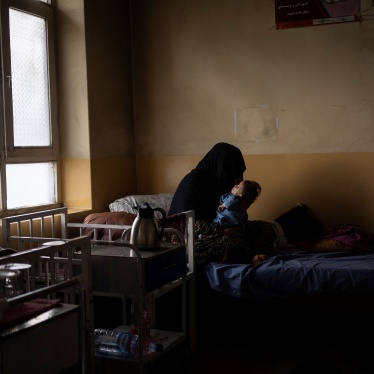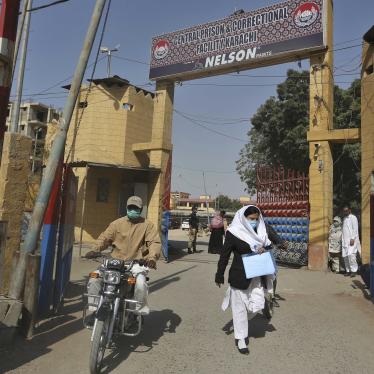(New York) - The Chinese government’s ongoing harassment of HIV/AIDS activists and intensified surveillance of AIDS support groups raise serious questions about its commitment to combating the illness, Human Rights Watch said today.
Over the past three weeks police have forced the cancellation of three separate meetings on HIV/AIDS in the city of Guangzhou in Guangdong province and Kaifeng in Henan province. Henan authorities have also ordered the closure of an HIV/AIDS support group’s offices and are harassing a leading HIV/AIDS activist there.
“These individuals and groups dedicated to addressing the enormous suffering wrought by China’s HIV/AIDS epidemic should not face police threats and harassment,” said Joe Amon, Human Rights Watch’s HIV/AIDS director. “China’s grassroots HIV/AIDS activists need and deserve praise and support, not intimidation tactics by state security forces.”
The latest round of government pressure began late last month when Public Security Bureau officers in Guangdong province forced the cancellation of a conference of Chinese and foreign HIV/AIDS experts on bolstering the legal rights of people living with HIV/AIDS. The cancellation of the meeting, organized by New York-based nongovernmental organization Asia Catalyst, was justified by the Public Security Bureau on the grounds that it involved topics considered “too sensitive” for public discussion.
Police subsequently cancelled two other HIV/AIDS meetings in Guangzhou and Kaifeng. Yi Ren Ping, a Beijing-based HIV/AIDS support group was told by local government authorities that it could not hold its planned August 4 meeting in Guangzhou. Kaifeng police cancelled the planned August 19-20 meeting organized by the China Alliance of People Living with HIV/AIDS, claiming that the organization “was not registered and was illegal,” Reuters reported on August 15.
On August 15, Henan province Public Security Bureau officials also ordered the “temporary” closure of the two provincial offices of the nonprofit China Orchid AIDS Projects, without providing any reason for the closure.
Chinese government authorities are also singling out individual activists. Kaifeng Public Security Bureau officers on August 16 ordered Zhu Zhaowu, the head of the Kaifeng office of the China Orchid AIDS Projects at Henan University, to clear out his office by noon the following day or risk his personal safety. Kaifeng authorities are reportedly now blocking Zhu’s efforts to secure new rental space for China Orchid AIDS Projects.
Human Rights Watch said that the Chinese government has a long history of persecuting people living with HIV and obstructing activists dedicated to supporting them.
In the 1990s Henan provincial authorities encouraged hundreds of thousands of low-income farmers to sell their blood, from which lucrative plasma was isolated and sold on the global market. To prevent anemia among those who donated blood frequently, the red cells left when the plasma was separated from the blood were pooled and re-injected into the donors’ arms without being screened for HIV or other blood-borne diseases.
The central government acknowledged the problem in the late 1990s and ordered the phasing out of the blood collection centers, but many continued to operate. It is estimated that thousands of rural dwellers died, in some cases virtually wiping out whole villages.
Human Rights Watch reported in 2003 that while the earliest of these cases of HIV transmission were inadvertent, the provincial authorities continued the practice in some locations even after it was known that HIV and other diseases had been transmitted in this way.
More recently, the Chinese government has strengthened legislation related to HIV/AIDS, including guaranteeing access to antiretroviral drugs, providing protection from discrimination, and rapidly expanding access to methadone therapy for injection drug users. Yet, despite the Chinese government’s repeated pledges to the international community that the prevention and treatment of HIV/AIDS is now a national priority, HIV/AIDS activists remain targets for repression by China’s security agencies.
“If the Chinese government had devoted as much energy to halting the epidemic as it has to persecuting activists, untold numbers of lives could have been saved,” said Amon. “Two decades of denial and repression are disgraceful.”
Dr. Gao Yaojie, a doctor who helped expose the Henan outbreak, was barred earlier this year from going to the US to receive a human rights award until an international outcry forced the Chinese government to reverse that decision. The husband-and-wife HIV/AIDS activist team of Hu Jia and Zeng Jinyan spent most of 2006 under house arrest. After a brief period of relative freedom, their house arrest order was renewed in May 2007. In April some 350 people infected with HIV/AIDS were blocked by police from protesting over ineffective government-supplied drug treatments in Zhengzhou.
Despite these repressive measures, as recently as July 17, Peter Piot, the head of UNAIDS, praised China’s government for “strong leadership” in combating HIV/AIDS and said that China “supports those AIDS patients and cares about those AIDS-affected orphans.”
“The Chinese government’s intensifying crackdown on HIV/AIDS activists deserves international condemnation, not baseless praise,” said Amon. “UNAIDS should make it clear to the Chinese government that ongoing persecution of HIV/AIDS activists is wrong, counterproductive, and threatens efforts to contain the disease.”





